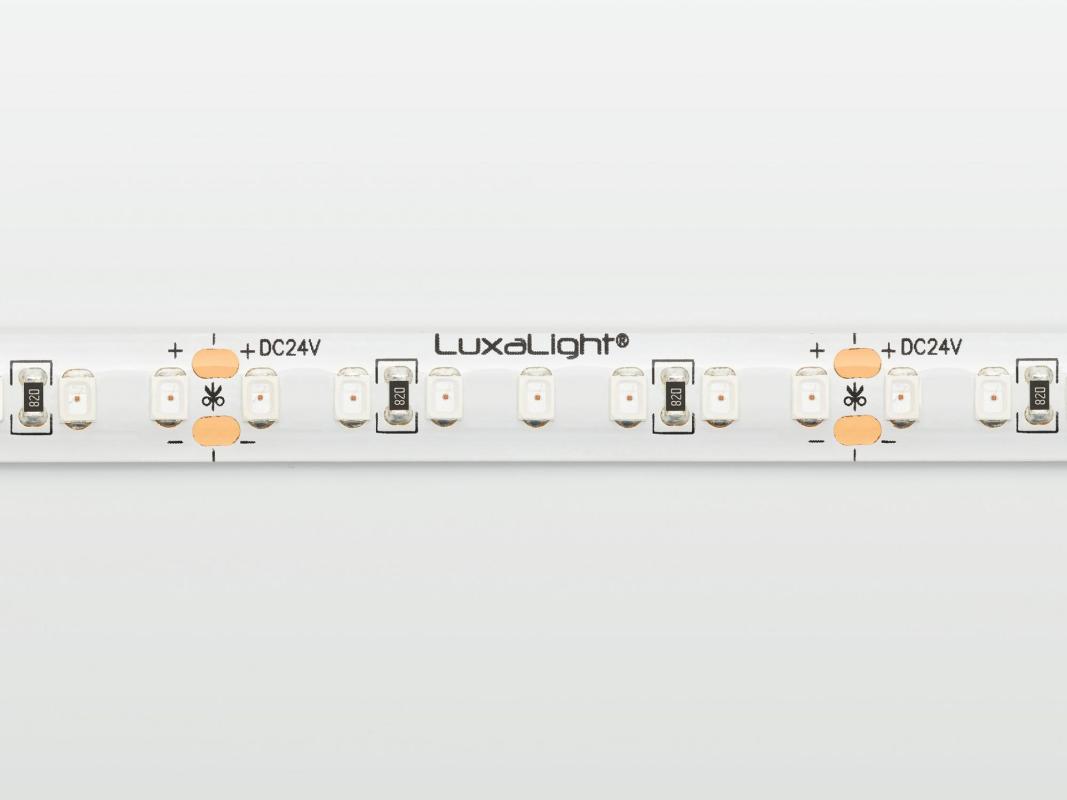LuxaLight LED-strip Far Red 730nm Protected (24 Volt, 140 LEDs, 2835, IP64)
Technical specifications
| Value | Measuring distance |
|---|---|
| 43,9 μmol/m2 | 25 mm |
| 18,8 μmol/m2 | 50 mm |
| 10 μmol/m2 | 75 mm |
| 7,05 μmol/m2 | 100 mm |
| 2,25 μmol/m2 | 200 mm |
| 1,19 μmol/m2 | 300 mm |
| Value | Measuring distance |
|---|---|
| 152 W/m2 | 25 mm |
| 63,8 W/m2 | 50 mm |
| 35,2 W/m2 | 75 mm |
| 24,3 W/m2 | 100 mm |
| 8 W/m2 | 200 mm |
| 4,25 W/m2 | 300 mm |
| Symbol | Function |
|---|---|
| V+ | V+ |
| GND | Ground |
Product description
The LuxaLight Industrial LED Engine is designed as a high-performance component for intensive industrial applications requiring high radiation intensity. With a 730nm deep red wavelength, this LED engine provides an efficient solution for processes that benefit from deep red light, such as plant growth stimulation, tissue regeneration, and more.
This LED engine is a semi-finished product, making it easy to integrate into custom fixtures or enclosures depending on the specific requirements of the application. It offers flexibility for use in various industrial, research, and medical applications where the powerful 730nm wavelength can deliver targeted results. The engine is designed for easy integration into larger systems or custom enclosures.
Key Features:
- 730nm Deep Red Wavelength: The 730nm deep red wavelength is ideal for applications requiring deep red light, such as horticulture, biological research, and specific industrial processes. It is also used for promoting tissue regeneration and therapeutic applications.
- 24V Power Supply: The LED engine operates on a reliable 24V power supply, ensuring stable and consistent operation, perfect for demanding applications.
- High Radiation Intensity: This LED engine delivers high radiation intensity, making it suitable for high-efficiency processes and applications requiring significant light output.
- Semi-Finished Product: The LED engine is designed to be integrated into custom systems or enclosures, offering flexibility for a wide range of industrial, research, or medical applications.
- Passive Cooling Required: The LED engine is designed to be passively cooled. This means it must be integrated into a suitable housing or system that efficiently dissipates heat to prevent overheating.
- Integration with MaNima Pollux Industry Pulsing (Strobing): The LED engine supports integration with the MaNima Pollux Industry System for pulsing (strobing), significantly increasing radiation intensity. This feature allows for faster reactions and improved efficiency in industrial processes.
- PCB thickness: The PCB has a thickness of 3 oz/ft², providing robust support and efficient heat dissipation.
Applications:
- Horticulture & Agriculture: The 730nm wavelength is highly effective for applications in horticulture, where deep red light helps promote flowering and fruiting in greenhouses and vertical farming environments.
- Biological Research: The LED engine can be used in scientific and medical applications, such as promoting tissue regeneration, cell cultivation, and photobiomodulation (PBM) therapy.
- Medical Therapy: 730nm deep red light is used in phototherapy treatments such as skin healing, anti-aging therapies, and muscle recovery, where the deep red light stimulates cells and tissues to promote healing.
- Food Industry: The 730nm wavelength can be used to stimulate growth in food production environments or in pasteurization processes of certain foods requiring exposure to deep red light.
- Industrial Material Curing (Non-UV): The deep red light can cure specific coatings and materials that respond to red wavelengths, providing effective and fast curing processes in industrial settings.
- Cosmetic Industry: The LED engine is suitable for use in the cosmetic industry for skin treatments such as reducing wrinkles, improving skin tone, and stimulating collagen production.
Benefits:
- High Radiation Intensity: The engine provides high radiation intensity, allowing for faster reactions and increased productivity in applications requiring deep red light.
- Flexibility in Integration: As a semi-finished product, the LED engine offers flexibility for integration into custom systems or enclosures, making it versatile for different applications.
- Efficient Performance: The LED engine provides efficient performance with stable output, ideal for environments needing consistent and reliable light.
- Passive Cooling for Reliable Performance: The LED engine requires passive cooling. It is important to integrate it into a system with proper ventilation and heat dissipation to prevent overheating and maintain long-term reliability.









